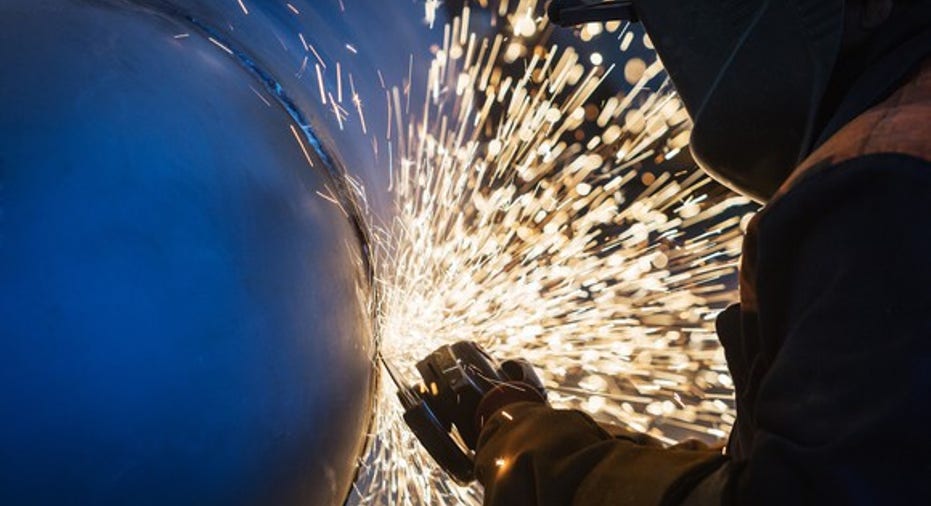US steelmakers raise their bets on energy, construction

Steelmakers are betting on the U.S. again, building mills they hope will help them compete against cheap imports as demand rises.
Steel companies have complained for years that steel from China, South Korea, Vietnam, Turkey and elsewhere is being sold in the U.S. for less than the cost to make it.
While imports are still increasing, steel prices are also on the rise globally. And demand for U.S. steel is starting to rebound, thanks to rising oil prices and a strengthening manufacturing sector, steel executives say. Still, others see expansion as a risky bet.
Some steel companies say they can capture more customers with new plants that can make more steel at less cost than older plants, and can deliver it faster to customers. They're also counting on additional U.S. tariffs to drive out cheap, foreign-made steel, creating more opportunities for domestic producers. Stiff tariffs imposed over the past 18 months have significantly slowed steel imports from China, according to Commerce Department reports.
Nucor Corp. is building a $250 million steel mill in Sedalia, Mo. Startup Big River Steel LLC in Osceola, Ark., accelerated production early this year at one of the largest new steel sheet mills built in the U.S. in years. And Tenaris SA started making pipe for oil and gas wells at a new $1.8 billion mill near Houston this month.
"Our view is the energy sector will continue to expand here for the next 10 to 20 years and justify more manufacturing in the states," said Paolo Rocca, chief executive of Luxembourg-based Tenaris.
Domestic steel shipments rose 5% in the first 10 months of 2017 compared with a year earlier and are on track to finish the year higher for the first time since 2014. At the same time, imports were also up 15% annually in the first 10 months of 2017, as imports shifted from China to other low-cost countries. Nucor said Dec. 19 that price pressure from imports has compressed its margins, and it forecast that its fourth-quarter earnings per share will be barely above last year's and below analysts' expectations.
Some industry analysts say the new U.S. mills could exacerbate that pressure, swamping a still-fragile domestic market. As Tenaris's new mill in Bay City, Texas, begins production, the company has nearby plants that remain mostly idle. Mills in the U.S. that supply well-site pipes are operating at about 60% of their maximum production, estimates market analytics firm Pipe Logix LLC.
"Building any more production capacity is just questionable," said Seth Rosenfeld, a Jefferies analyst. "These companies' actions don't align with what they've been saying about the state of the steel market."
But Pipe Logix also estimates that the number of oil and gas wells drilled in the U.S. increased by 60% this year over 2017, and steel executives expect more growth next year.
Tenaris hopes to benefit from that growth by doubling its U.S. pipe-making capacity to about 1 million tons annually. Tenaris plans to sell it directly to well drillers, eliminating independent distributors. Without the middlemen's markup, Tenaris says it can beat its domestic rivals on price. It also expects continued U.S. tariff pressure on foreign competitors to drive down imports that now make about 70% of the U.S. well-pipe market.
Tenaris is also pledging to provide engineering and technical support to customers and to take back pipe that drillers don't use. "This is a way of working that requires a very intimate relationships with customers," Mr. Rocca said.
Some U.S. steel companies also see opportunities in rebar, the reinforcing bar used to strengthen concrete in construction projects. Rebar imports are on pace to drop by 17% in 2017, according to Commerce Department, as duties and higher prices for the scrap steel used to make it decrease shipments.
Nucor's new Missouri mill will allow the North Carolina-based company to produce rebar closer to where its customers use it in buildings, bridge piers and highways. Nucor said it chose a site near Kansas City because most of the rebar used in the region now is shipped in from elsewhere.
"The closer we are to that market, the more successful we could be," CEO John Ferriola said.
Nucor also intends to buy scrap steel for its rebar near the new mill, which is scheduled to open in 2019. "That's going to give us a cost advantage in serving that market," Mr. Ferriola said.
Texas-based Commercial Metals Co., is building a similar regional rebar mill in Durant, Okla., after opening one in Mesa, Ariz., in 2009.
Big River, backed by Koch Industries Inc. and the Arkansas teacher's retirement fund, designed its mill in northeast Arkansas to produce lightweight sheet steel for cars with an electric furnace, challenging established competitors that make steel for cars with coal-fired furnaces. The company says the mill can be adapted to produce different flat-rolled steel products, potentially leaving it less vulnerable to supply gluts than mills making just one or two products.
Write to Bob Tita at robert.tita@wsj.com



















